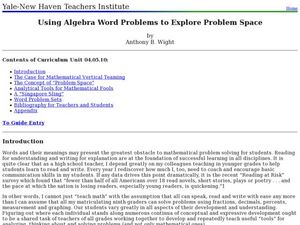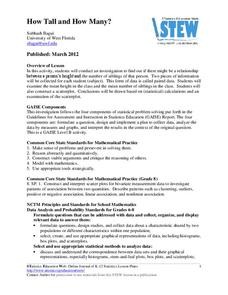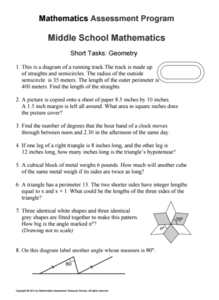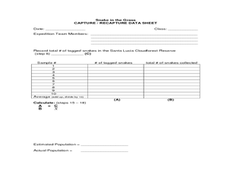Curated OER
Rectangular Gardens Within A Given Perimeter
Sixth graders design rectangular gardens with a given perimeter and generalize how to maximize the area Students applying the formulas for perimeter and area of polygons. They analyze length, area, and volume and make relationships...
Curated OER
Measures of Central Tendency Using Scientific Calculators
Learners explore mean, median, and mode as they model mathematics in real-world problem situations. The instructional activity requires the use of the TI 30X IIS.
Kent State University
How Does that Work?
Sixth and seventh graders explore algebra word problems. They work with a partner to solve word problems distributed by e-mail. Learners simplify mathematical expressions following a "think aloud" algebra strategy modeled by the teacher....
Curated OER
Using Algebra to Explore Problem Space
Students apply their knowledge of math by rewriting word problems using equations. In this word problem lesson, students build upon previous knowledge as they set up the correct steps to solve word problems. This lesson is full of hints...
American Statistical Association
How Tall and How Many?
Is there a relationship between height and the number of siblings? Classmates collect data on their heights and numbers of brothers and sisters. They apply statistical methods to determine if such a relationship exists.
Mathematics Assessment Project
Geometry
Help learners find joy in facing mathematical challenges. The questions posed on this worksheet encourage young mathematicians to utilize skills learned throughout a geometry unit, and to apply themselves and persevere through problem...
Mathematics Vision Project
Module 8: Statistics
What does it mean to be normal in the world of statistics? Pupils first explore the meaning of a normal distribution in the eight-lesson module. They then apply the statistics related to normal distributions such as mean, standard...
Curated OER
Put Your Truss in Building Bridges
Students apply abstract concepts, such as stress, fulcrums, the law of gravity, and the strength of different geometric shapes. Groups of student contractors operate simulated architectural firms to create strong, economical bridges.
Curated OER
Taking the Boat to Manaus
Fifth graders apply the concepts they know regarding mass, volume and density in the previous activities to design a boat. Student teams must make a boat which can travel the waters of the Amazon Rainforest. Each group makes a...
Curated OER
How Long Can You Go?
Eighth graders examine the usefulness of a line of best fit by collecting and graphing data, using a graphing calculator to determine the line of best fit, and making a variety of predictions. They watch a video, then design a...
Centre for Education in Mathematics and Computing
Number Sense and Numeration: Exponents
On a three-page assignment, number crunchers will examine the laws of exponents and apply them to a variety of problems. They write expressions in exponential form or as repeated multiplication. They evaluate and simplify exponential...
Curated OER
Snake in the Grass: Capture/Recapture Activity
Learners estimate the total number of species in Ecuador using the capture/recapture method. They collect data about each species and act as members of a science expedition to determine the total number of species by using mathematical...
Curated OER
Dinosaur Math
Second graders practice vocabulary related to measurement, mathematics, and dinosaurs. Using the engaging topic of dinosaurs, learners will calculate various information about dinosaurs and use measurement vocabulary. They will also...
Curated OER
Two-Digit Subtraction With and Without Regrouping
Second graders subtract two-digit numbers. In this mathematics lesson, 2nd graders subtract both with and without regrouping. Students use manipulatives and place value mats to assist in problem solving.
Curated OER
Systems of Equations and Real Life
What a great classroom resource! The intention of this lesson is to show that real-world math can and should be applied to the community in which your students reside. The class relates properties of equations to solving for species...
Illustrative Mathematics
Computing Volume Progression 2
Once your geometers know how to apply the formula V = l w h, they will be ready to take on the fractional volume of a fish tank. Have your number crunchers swap heights so they can see that the fractional volume will not change.
Illustrative Mathematics
Running on the Football Field
Make your class into Pythagorean theorem fanatics in no time. What a great resource to get your sports enthusiasts into the math game! Read the commentary so you can you can strategize how to apply the three math practices.
Teach Engineering
Nanotechnology Grant Proposal Writing
Please, sir, can I have a few thousand dollars for my research? The last installment in a six-part lesson has the pupils develop a grant proposal. Class members apply their knowledge of skin cancer, ultraviolet radiation, human skin, and...
Bowland
Olympic Cycling
Teach teenagers to think critically about data. Young data analysts must create two questions that can be answered using a provided data set on Olympic cycling times. Of course, they then have to answer their questions using mathematics.
PHET
CME Plotting
Young scientists build on their previous knowledge and apply it to coronal mass ejections. By plotting the path of two different coronal mass ejections, they develop an understanding of why most don't collide with Earth.
Code.org
Public Key Cryptography
Investigate how public key cryptography works. Scholars continue their study of one-way functions and asymmetric keys and apply this information to public key cryptography. They use an app to explore public key cryptography and its...
Noyce Foundation
Perfect Pair
What makes number pairs perfect? The resource provides five problems regarding perfect pairs of numbers, the definition of which changes in complexity with each task. Solutions require pupils to apply number sense and operations, as well...
Noyce Foundation
Diminishing Return
Challenge individuals to compete as many tasks as possible. Lower-level tasks have pupils apply costs and rates to solve problems. Upper-level tasks add algebraic reasoning and conditional probability to the tasks.
CCSS Math Activities
Cereal
Your breakfast cereal is a good source of math practice. Young mathematicians apply ratios and percents to analyze the amount of protein and carbohydrates in two brands of cereal. They complete a worksheet to answer several questions on...

























